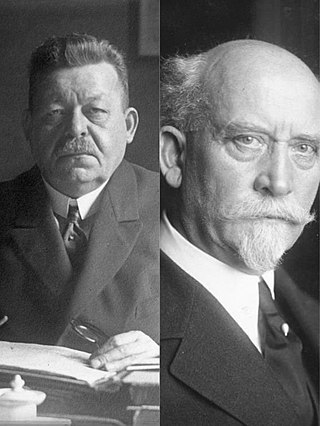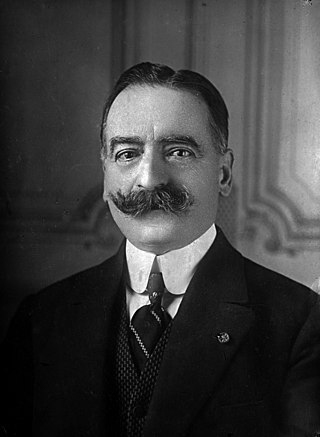
General elections were held in the Netherlands on 3 July 1918. They were the first elections held after a series of reforms that introduced universal male suffrage and pure proportional representation, replacing the previous two-round system in single member constituencies. This change was known as the Great Pacification, which also included the introduction of state financing of religious schools, and led to the start of consociational democracy.

General elections were held in the Netherlands on 5 July 1922. They were the first elections held under universal suffrage, which became reality after the acceptance of a proposal by Henri Marchant in 1919 that gave women full voting rights. Almost all major parties had a woman elected. The number of female representatives increased from one to seven. Only the Anti-Revolutionary Party principally excluded women from the House of Representatives. Another amendment to the electoral law increased the electoral threshold from 0.5% to 0.75%, after six parties had won seats with less than 0.75% of the vote in the previous elections.

Federal elections were held in Germany on 20 February 1890. The Centre Party regained its position as the largest party in the Reichstag by winning 107 of the 397 seats, whilst the National Liberal Party, formerly the largest party, was reduced to 38 seats.
The Democratic Party is a centre-right political party in Bulgaria led by Alexander Pramatarski. The party was a member of the European People's Party (EPP).

Federal elections were held in Germany on 19 January 1919, although members of the standing army in the east did not vote until 2 February. The elections were the first of the new Weimar Republic, which had been established after World War I and the Revolution of 1918–19, and the first with women's suffrage. The previous constituencies, which heavily overrepresented rural areas, were scrapped, and the elections held using a form of proportional representation. The voting age was also lowered from 25 to 20. Austrian citizens living in Germany were allowed to vote, with German citizens living in Austria being allowed to vote in the February 1919 Constitutional Assembly elections.

Parliamentary elections were held in Montenegro on 20 October 2002. The result was a victory for the For a European Montenegro alliance formed by the Democratic Party of Socialists (DPS) and the Social Democratic Party (SDP), which won 39 of the 75 seats. It was the last parliamentary election held in Montenegro prior to independence referendum in 2006.

General elections were held in Luxembourg on 13 June 1999, alongside European Parliament elections. The Christian Social People's Party remained the largest party, winning 19 of the 60 seats in the Chamber of Deputies. It formed a coalition government with the Democratic Party.
The Russian Party in Estonia was a minor political party in Estonia.

General elections were held in Belgium on 17 February 1946. The result was a victory for the Christian Social Party, which won 92 of the 202 seats in the Chamber of Representatives and 51 of the 101 seats in the Senate. Voter turnout was 90.3%.

General elections were held in Belgium on 26 March 1961. The result was a victory for the Christian Social Party, which won 96 of the 212 seats in the Chamber of Representatives and 47 of the 106 seats in the Senate. Voter turnout was 92.3%. Elections for the nine provincial councils were also held.

General elections were held in Belgium on 27 November 1932. The Catholic Party won 79 of the 187 seats in the Chamber of Representatives and 42 of the 93 seats in the Senate. Voter turnout was 94.3%.
Parliamentary elections were held in Norway on 21 October 1915, with a second round between 4 and 11 November. The result was a victory for the Liberal Party, which won 74 of the 123 seats in the Storting.
Parliamentary elections were held in Hungary on 25 and 26 January 1920. However, they were only held in 164 districts. After the Treaty of Trianon was signed, the 44 districts previously occupied by Romania voted between 13 June and 5 July, whilst the 11 districts occupied by Serbia did not vote until 30 and 31 October 1921. The election was held with compulsory voting. In protest at this and other changes to the franchise that left 60% of the voting age population unable to vote, the Hungarian Social Democratic Party boycotted the elections, and called for its supporters to cast invalid votes, resulting in an unusually high number of blank or invalid votes – 12% in the January elections and over 20% in Budapest and other major cities.

Parliamentary elections were held in Latvia on 6 and 7 October 1928. The Latvian Social Democratic Workers' Party remained the largest party, winning 25 of the 100 seats.

General elections were held in Liechtenstein on 11 March 1918, with a second round on 18 March. They were the first elections held in the country contested by political parties, as the Christian-Social People's Party and Progressive Citizens' Party had been founded that year. The Progressive Citizens' Party emerged as the largest in the Landtag, winning seven of the 12 elected seats.

General elections were held in Macedonia on 16 October 1994 to elect a President and Assembly, with a second round of Assembly elections on 30 October. The presidential election was won by Kiro Gligorov of the Alliance for Macedonia, whilst the parties forming Alliance for Macedonia also won the Assembly elections with 95 of the 120 seats. However, the second round of the Assembly elections were boycotted by VMRO-DPMNE and the Democratic Party, as they claimed there had been irregularities in the first round.

General elections were held in Portugal on 28 April 1918, following a coup by Sidónio Pais in December 1917. The elections were boycotted by the Democratic Party, the Evolutionist Party and the Republican Union, who had won over 90% of the seats in the 1915 elections.

Parliamentary elections were held in Portugal on 11 May 1919. The three main parties that boycotted the 1918 elections returned to contest the elections. The result was a victory for the Democratic Party, which won 86 of the 163 seats in the House of Representatives and 36 of the 71 seats in the Senate.
The German-Baltic Party was a political party in Estonia representing the German minority.
The Alliance of Social Democrats was a social-democratic political party in Iceland. The party was founded by Vilmundur Gylfason and won four seats in the 1983 elections


















